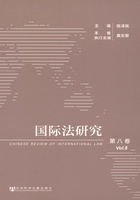
五 结论
由上述分析不难看出,从国际关系的维度看,世界虽然处于全球化的进程中,国家之间的相互依赖在增强,但国家之间的贫富分化、南北国家之间的差异和斗争依然存在;帝国虽然已经不存在了,但帝国主义思想还在,霸权主义使得世界和平依然受到严重的威胁;殖民体系虽然已然瓦解,但殖民思想还在,世界仍然是一个白人主导的世界。国际法一个世纪以来的发展,仅仅是量变,而非质变;仅仅是表面规范和机制的增加,而非深层基调的转换;仅仅是外在的形式的变化,而非内在的精神的变革。国际法的运行仅仅是形式上的增强,并没有出现根本上的差异。今天,国际秩序仍然是一个以国家主权、国家意志为主导的秩序,这也就意味着国家力量、国家能力的大小决定了国际事务的方向。大国可以以自己的偏好决定国际事务的走向,小国却只能被动接受。国家中心主义、国家利益至上、国家之间的斗争和竞争仍然是国际关系的主流。大国决定世界,小国被世界决定。少数大国的眼界决定了多数大国的世界。由此,国际法仍然是协定法、平位法、弱法,仍然是以国家为核心主体的法。
总体看来,虽然国际法的伦理性在不断提升,其政治性却依旧重要。如果从政治性的角度进行区分,国际法可以分为高政治、中政治、低政治等各个层面。高政治的武力与领土安全问题,主要靠国家的力量对比来决定,法律在多数时候仅仅是一种修饰。中政治的经济交往问题,国家靠利害分析来决定行为,对自身有利的,国家就会积极遵守国际法,对自身不利的,国家就可能逃避法律规范。低政治的人权、人道、环境等领域,国家之间可能会形成共同的观念,在一般情况下国家会积极拥护和遵行,但是在与国家安全和基本利益相矛盾的时候,就可能放弃这些基本观念。所以国际法没有变成超国家法、垂直法、强法,而仍然是平位法、协定法、弱法,[42]这是我们认识当今国际法地位的基本论断和重要前提。
与此同时,必须认识到,尽管有国际社会的组织化,国际法的条约化,国际规范的等级化、司法化、宪政化、人本化,但千变万化,国际关系仍然以大国为核心,大国对于国际社会的发展有更大的能量,关键看这个国家是为自身谋取霸权还是为社会寻求公正。总体上看,在这个世界上,大国、大国的立场、大国的声音越多,国际关系就越容易公平,国际法就越容易公正有效。所以中国要成为大国,在国际社会彰显自身的立场、声音,表达自己的话语,为国际法的进一步完善、为国际社会的进一步提升做出自己的贡献。
Change and Constancy in International Law
He Zhipeng
Abstract:Since the 20th century,especially after the World War II,international law changed in some aspects,but remained unchanged in others. The types of subjects increased,but the status of states as the core subject is still as before. The number of states increased due to decolonization,but the key function of the great powers is still evident. Although the field of international law expanded,more norms are created,forms of norms are various,it is clear that state security is the central problem of international law. The sources and operation of international law reflects the development of international rule of law,but the reality is that power politics is still dominant. To conclude,international law changed superficially,quantitatively,but not the nature,qualitatively. The environment of international relations and notion of states dominate changes and stability of international law. The implications of changes and stability of international law is that international law and global governance could not be highly relied on at the present,any progress needs great efforts. Only when all actors strive hard,it is possible for international rule of law to be realized.
Key Words:International Law;Subjects;Norms;Operation;International Rule of Law;Change
[1] 本文系受车丕照教授的观点启发而成。2011年11月,在中国社会科学院举办的“中国社会科学论坛暨国际法论坛”的总结发言中,车丕照教授阐述了“国际法最近出现了很多变革,但有些方面仍然没有变”的观点,笔者多有认同。故据个人读书与思考,撰写本文的初稿,车丕照教授阅读后在结构上提出了修改建议。在2012年的“中国社会科学论坛暨国际法论坛”上,笔者陈述了基本观点后,受到了很多与会专家的指教,故进行了修订。本文受到了吉林大学青年学术领袖培育计划“国际法的中国理论”(2012FRLX10)的支持。
[2] 何志鹏,法学博士,吉林大学法学院教授,博士生导师。
[3] 邵津主编《国际法》,北京大学出版社、高等教育出版社,2008,第7页。
[4] 梁西主编、曾令良修订主编《国际法》,武汉大学出版社,2011,第23页。
[5] 邵沙平主编《国际法》,高等教育出版社,2008,第9页。
[6] 王铁崖:《国际法引论》,北京大学出版社,1998,第289、297~301页。
[7] 杨泽伟:《国际法史论》,高等教育出版社,2011,第199页。
[8] 周忠海主编《国际法》,中国政法大学出版社,2007,第16页。
[9] 《中国大百科全书·法学》(修订版),中国大百科全书出版社,2006,第164页。
[10] 丘宏达:《现代国际法》(修订二版),三民书局,2006,第24页。
[11] 王铁崖:《联合国与国际法》,《中国国际法年刊》(1986),中国对外翻译出版公司,1986,第4页。
[12] 白桂梅:《国际法》(第二版),北京大学出版社,2010,第12页。
[13] Encyclopedia Britannica,15th ed.(Encyclopedia Britannica Inc. 2010),vol.21,p.790.
[14] Malcolm D. Evans (ed.),International Law,3rd ed.(Oxford University Press,2010),p.24.
[15] David J. Bederman,International Law Frameworks,3rd ed.(Foundation Press,2010),p.5.
[16] 白桂梅:《国际法》(第二版),北京大学出版社,2010,第236~241页;《中国大百科全书·法学》(修订版),中国大百科全书出版社,2006,第173页。
[17] 参见Anglo-Iranian Oil Co. Case (United Kingdom v. Iran),Judgment of July 22nd 1952,I.C. J. Reports 1952,p.93。
[18] 参见王彦志《国际投资条约的保护伞条款》,《中国国际法年刊》2008年卷,世界知识出版社,2009,第295~341页。
[19] 参见梁西主编、曾令良修订主编《国际法》(第三版),武汉大学出版社,2011。
[20] Peter Malanczuk,Akehurst’s Modern Introduction to International Law,7th ed.(Rougledge,1997),p.27.
[21] 有考证指出,早在奥维尔的这句名言广被流传之前20余年,R. Andom就提到“All men are equal,but some are more so than others”,Walter Barrett,Stanley Paul & Co,1913.
[22] Cf. Lori F. Damrosch,Louis Henkin,Sean D. Murphy,and Hans Smit, International Law:Cases and Materials,5th ed.(Thomson Reuters:West,2009),p.29;苏义雄:《平时国际法》(修订第四版),三民书局,2007,第371~391页。
[23] 《中国大百科全书》第8卷(第二版),中国大百科全书出版社,2008,第361页。
[24] Peter Malanczuk,Akehurst’s Modern Introduction to International Law,7th ed.(London:Routledge,1997),p.16.
[25] Malcolm N. Shaw, International Law,6th ed.(Cambridge University Press,2008),p.31.
[26] 参见罗国强《强行法的国际法渊源属性》,《中国国际法年刊》2008年卷,世界知识出版社,2009第143~144页。
[27] Mary Ellen O’Connell,Richard F. Scott,and Naomi Roht-Arriaza, The International Legal System:Cases and Materials,6th ed.(Foundation Press,2010),p.1163.
[28] John Baylis,Steve Smith,and Patracia Owens,The Globalization of World Politics,5th ed.(Oxford University Press,2011),p.282.
[29] Hans Kelsen,The Pure Theory of Law,translated by Max Knight(University of California Press,1970),p.1,chapter 7;also in Kelsen,General Theory of Law and State (Harvard University Press,1945) pp.325-363;David Armstrong,Theo Farrell,and Hélène Lambert,International Law and International Relations (Cambridge University Press,2007),pp.11-12;当前,这种自助的方式仍然存在,而且在以往报复、反报的基础上被提炼成为“反措施”,具体分析参见李永胜《论国际法上的反措施制度》,《中国国际法年刊》2010年卷,世界知识出版社,2011,第78~119页。
[30] 参见白桂梅主编《人权法学》,北京大学出版社,2011,第226~258页;并参见徐显明主编《国际人权法》,法律出版社,2004,第110~173页。
[31] 参见王贵国《世界贸易组织法》,法律出版社,2003。
[32] Anthony Aust,Handbook of International Law,2nd ed.(Cambridge University Press,2005)pp.430-448.
[33] Paul Craig and Gráinne de Búrca,EU Law:Text,Cases,and Materials,5th ed.(Oxford University Press,2011),pp.482-544;Damian Chalmers,Gareth Davies,and Giorgio Monti,European Union Law:Cases and Materials,2nd ed.(Cambridge University Press,2010),pp.142-227.
[34] 薛捍勤:《新世纪国际法的挑战》,《中国国际法年刊》2002/2003年卷,法律出版社,2006,第297页。
[35] Gillian D. Triggs, International Law:Contemporary Principles and Practices,2nd ed.(LexisNexis Butterworths,2011),p.18.
[36] 对于“不对称性”这一概念,国际关系学者Brantly Womack用来表述国家之间力量不对等、影响能力不同的状况。Brantly Womack,“Asymmetry Theory and China’s Concept of Multipolarity”,13 Journal of Contemporary China (2004) 351;Brantly Womack,“China and Southeast Asia:Asymmetry,Leadership and Normalcy”,76 Pacific Affairs (2003) 529. 笔者转化并套用这一概念在这里表达在国际法体系中国家遵行和操作的能力差异。
[37] Louis Henkin,How Nations Behave:Law and Foreign Policy,2nd ed.(New York:Columbia University Press,1979),p.47.
[38] 笔者对于此类问题的分析,参见何志鹏《保护的责任:法治黎明还是霸权再现》,《当代法学》2003年第1期;何志鹏:《大国政治中的正义谜题》,《法商研究》2012年第5期;何志鹏:《从强权入侵到多元善治》,《法商研究》2011年第4期;何志鹏:《大国政治中的司法困境》,《法商研究》2010年第6期。
[39] 参见李玉民《近代中国的“条约制度”论略》,《湖南师大学报》1992年第6期;陈公禄:《中国近代史》,中国工人出版社,2012,第30~90、230~270页。
[40] 刘德斌主编《国际关系史》,高等教育出版社,2003,第300~301页。
[41] 王绳祖主编《国际关系史》第六卷,世界知识出版社,1995,第270~292、327~350、364~382页。
[42] 参见何志鹏《在政治与伦理之间:本体维度的国际法》,《浙江大学学报》(人文社会科学版)2012年第5期。